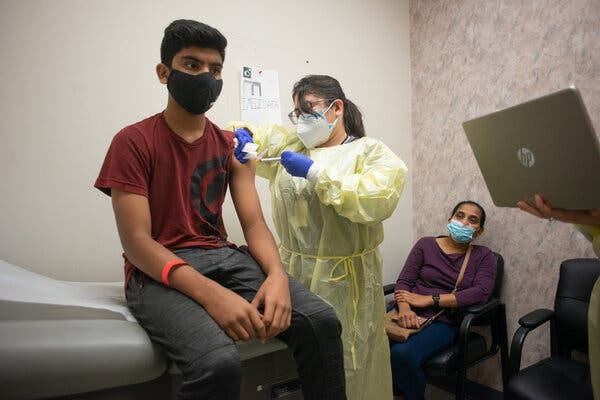
The European Medicines Agency, the European Union’s main drug regulator, on Friday authorized the use of Moderna’s Covid vaccine for children age 12 and older, clearing the way for final approval by the bloc.
The agency approved the vaccine for those older than age 18 in January. The vaccine is also licensed for those 18 and older in the United States, Canada and Britain.
The protocol for children will be the same as for adults — two shots four weeks apart — the regulator said. Sore arms, headache and fatigue were the side effects most commonly reported among teenagers receiving the vaccine, it said, similarly to adults.
The agency’s recommendation will go to the European Commission, the bloc’s administrative arm, for a final approval. Deciding if and when to begin using the vaccine on children is up to the E.U.’s 27 national governments.
Until now, the only vaccine approved for those 12- to 17-years-old in Europe and North America has been the one from Pfizer-BioNTech. The bloc’s drug regulator recommended it for children in late May, and the European Commission swiftly approved it. More than a dozen E.U. countries have since begun vaccinating children.
The E.U. vaccination campaign has accelerated considerably in recent weeks, and even overtook the immunization level in the United States, with over 67 percent of the population now inoculated with at least one dose, and 53 percent fully immunized according to data gathered by the European Center for Disease Prevention and Control. Fifty-six percent of the U.S. population has received at least one dose, and 49 percent are fully vaccinated.
The bloc has obtained enough doses to reach its goal of fully vaccinating 70 percent of the adult population by the end of July, the commission said earlier this month. But despite the overall high level of immunization, important divergences remain between the bloc’s member nations.
The European Center for Disease Prevention and Control warned on Friday in a joint statement with the World Health Organization that the Delta variant is now dominant in the majority of the bloc’s nations, and urged the “fast rollout of vaccinations,” highlighting that full inoculation significantly reduces the risk of severe disease and death.
“When called to do so, people should get vaccinated,” Dr. Hans Henri P. Kluge, the W.H.O.’s director for Europe, said in a statement.
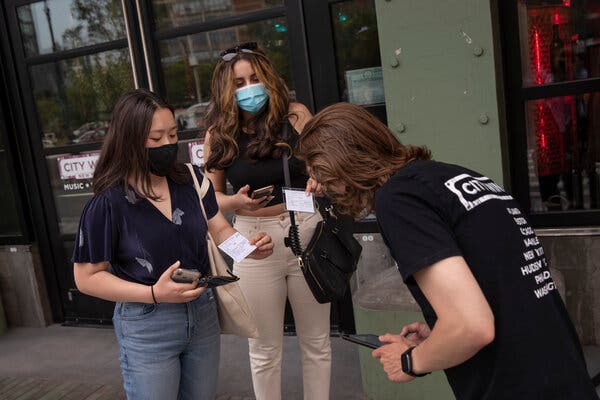
Mayor Bill de Blasio urged on Friday that New York City’s private businesses require their workers to get vaccinated against the coronavirus and signaled that he would introduce similar measures for hundreds of thousands of municipal employees.
The mayor’s comments came just days after he announced that all employees in the public hospital system would have to either receive a virus vaccine or submit to weekly testing.
The highly contagious Delta variant has fueled outbreaks among the unvaccinated across the United States and in recent days many local governments and private organizations have been grappling with whether to put vaccination mandates in place. Several organizations — including various hospital systems, schools, the city of San Francisco and professional football — have taken steps to require vaccinations.
The mayor’s new position reflected growing concern that New York, like much of the United States, is on the verge of another wave of the pandemic. In just a few weeks, case counts in the city have tripled, to more than 650 a day on average, while inoculation rates have leveled off.
“If people want freedom, if people want jobs, if people want to live again, we have got to get more people vaccinated,” Mr. de Blasio said on Friday during a weekly radio appearance on WNYC. “And obviously it’s time for whatever mandates we can achieve.”
Although nearly five million New York City residents have received at least one dose of vaccine, the speed at which new shots are being administered has slowed. Nationally, 57 percent of Americans have gotten at least one vaccine dose; 49 percent are fully vaccinated.
New York City officials have tried everything from mobile vaccination sites to in-home vaccination visits to offering incentives like cash and movie tickets, but they have yet to see a significant rise in inoculations.
Even vaccinations among employees of many city agencies — including the Police Department, the Fire Department and the public schools — have remained below the citywide rate of full vaccination among adults, 65 percent.
“We have reached the limits of purely voluntary,” Mr. de Blasio said on Friday. “It’s time for more mandates.”
On Thursday, the National Football League on Thursday sent a memo to all 32 teams saying that players who refuse to receive a Covid-19 vaccine may risk their teams’ forfeiting games if they test positive and cause an outbreak.
Nationally, new cases, hospitalizations and deaths remain far below their winter peaks, but the rapid spread of the Delta variant has led to a steep rise in hospitalizations in some spots around the country where people have been slower to get vaccinated.
The number of new cases in the country has nearly tripled in the last two weeks, with an average of more than 45,000 infections now being diagnosed each day.
Dr. Rochelle P. Walensky, director of the Centers for Disease Control and Prevention, recently warned that “this is becoming a pandemic of the unvaccinated” and that the United States had reached a “pivotal point.”
Vaccines remain effective against the worst outcomes of Covid-19, including from the Delta variant, and experts say breakthrough infections in vaccinated people are so far still relatively uncommon.
Still, hospitalizations are now trending upward in 45 states, and some health care centers in portions of the Midwest, West and South are struggling. Florida has recently seen the most hospitalizations for Covid-19 since the start of the pandemic.
The Biden administration has pursued multiple strategies to get more people vaccinated and, as that pool has shrunk, focused on more personalized efforts to reach those who have not gotten shots.
On Friday, Jen Psaki, the White House press secretary, again rejected the idea of a nationwide mandate to take the vaccine, saying it is not the role of the federal government to impose that choice on people.
“There will be institutions, there will be private sector companies and others who make decisions about how to keep their community safe. That’s certainly appropriate,” Ms. Psaki said.
Reed Abelson and Dan Levin contributed reporting.
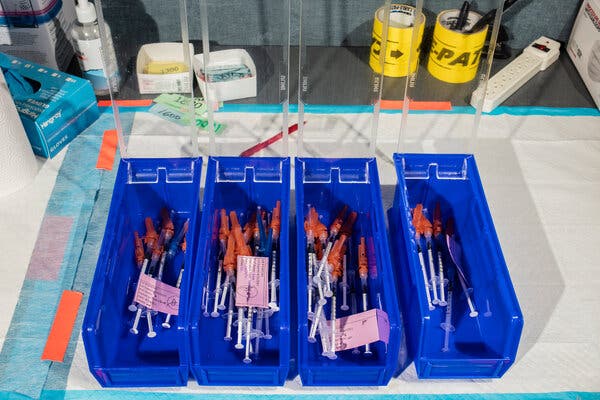
As research continues into how long coronavirus vaccines remain effective, Biden administration health officials increasingly think that vulnerable populations will need booster shots.
Senior officials now say they expect that people who are 65 and older or who have compromised immune systems will most likely need a third shot from Pfizer-BioNTech or Moderna, two vaccines based on the same technology that have been used to inoculate the vast majority of Americans thus far.
That is a sharp shift from just a few weeks ago, when the administration said it thought there was not enough evidence to back boosters yet.
The growing consensus within the administration that at least some Americans will need a booster is tied in part to research suggesting that the Pfizer vaccine is less effective against the coronavirus after about six months. More than half of those fully vaccinated in the United States so far have received Pfizer’s vaccine.
Pfizer’s continuing global study of its clinical trial participants shows that four to six months after the second dose, the vaccine’s effectiveness against symptomatic infection drops from a high of 95 percent to 84 percent, according to the company.
Data from the Israeli government, which has fully vaccinated more than half of its population with Pfizer doses since January, also points to a downward trend in effectiveness over time, although administration officials are viewing that data cautiously because of wide margins for error.
Dr. Anthony S. Fauci, who heads the infectious disease division of the National Institutes of Health, said the apparent steep falloff in the Pfizer vaccine’s effectiveness in the Israeli data had epidemiologists “raising their eyebrows a bit.”
The administration has already purchased more than enough vaccine to deliver third doses of both Pfizer and Moderna, and has been quietly preparing to expand the distribution effort, should it become necessary.
Dr. Paul A. Offit, a member of the Food and Drug Administration’s outside advisory committee of vaccine experts, said a rise in mild or moderate cases of Covid-19 among vaccinated people did not necessarily mean a booster was required.
“The goal of this vaccine is not to prevent mild or low, moderate infectious disease,” he said. “The goal is to prevent hospitalization to death. Right now this vaccine has held up to that.”
Prematurely dangling the prospect of a third dose could also work as a deterrent against vaccination, making people less likely to get their initial shots, other health experts said.
“We don’t want people to believe that when you’re talking about boosters, that means that the vaccines are not effective,” Dr. Fauci said a congressional hearing Tuesday. “They are highly effective.”
Noah Weiland contributed reporting.
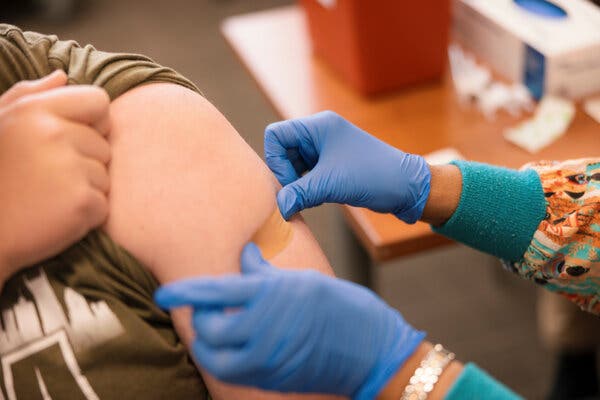
Tennessee health officials are resuming several programs to promote vaccinations for public school students, just two weeks after such efforts were halted because Republican elected officials had complained that parents should make the decisions.
The criticism of the programs had reached a fever pitch just before the firing of the state’s top immunization official, Dr. Michelle Fiscus, earlier this month.
Dr. Fiscus, medical director for vaccine-preventable diseases and immunization programs, attributed her ouster to the pushback among Republican lawmakers in the state. She is one of scores of public health officials across the United States who have quit or been forced from their jobs in a political climate that has grown increasingly polarized over the coronavirus and the vaccines.
On Friday, Dr. Lisa Piercey, the state health commissioner, said at a news conference that the state had temporarily suspended its outreach efforts in light of the criticism from conservatives, but officials were now trying to target messages to parents. She said the department would be taking part in several back-to-school vaccine events in partnership with schools.
“There was a perception we were marketing to children and that was totally against our view of the importance of parental authority,” she said. “We strongly believe that parents are the best decision markers.”
The state health department has also removed its logo from school-based fliers and has now revised fliers and reminder postcards to ensure they are directed at parents. The department also took down social media posts that depicted a child without a parent.
In a text message on Friday, Dr. Fiscus said the state’s decision to halt the programs, even temporarily, had a cost. “It’s unfortunate that Tennessee Department of Health chose to pause outreach to vulnerable populations during back to school and that we lost two weeks of critical time to vaccinate children, but I’m happy to hear they’re resuming now,” she said.
New cases in Tennessee have more than tripled over the past 14 days, to nearly 900 new infections a day, according to a New York Times database. Hospitalizations have risen about 68 percent to an average of 462 each day last week. Dr. Piercey said that in some counties 20 percent of coronavirus tests were coming back positive.
Republicans had charged that the state’s previous public-service advertisements urging teenagers to be vaccinated had gone too far in its efforts to raise awareness of the shot among young people.
“When you have advertisements like this, with a young girl with a patch on her arm, all smiling,” Scott Cepicky, a Republican state representative, said as he held up a printout of a social media post during a recent hearing. “We all know how impressionable our young people are, and wanting to fit in life.”
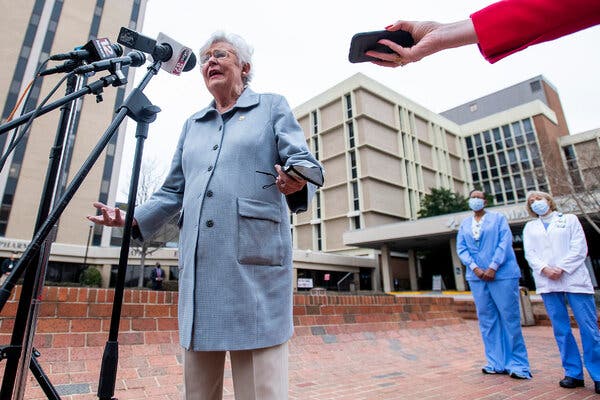
Breaking with many of her fellow elected Republicans, Gov. Kay Ivey of Alabama this week placed the blame for rising coronavirus cases in her state on “the unvaccinated folks” and said that she had run out of ideas for how to change minds.
“Folks are supposed to have common sense, but it’s time to start blaming the unvaccinated folks, not the regular folks,” Governor Ivey said during a news conference on Thursday. “It’s the unvaccinated folks that are letting us down.”
Alabama has the nation’s lowest vaccination rate, with only about 33.9 percent of residents fully vaccinated, according to federal data.
The average number of new daily cases in the state has tripled in the last two weeks, to more than 1,100 a day, the highest rate since mid-February, according to a New York Times database. Hospitalizations have also increased, and almost 100 percent of those are unvaccinated people, Ms. Ivey said.
“These folks are choosing a horrible lifestyle of self-inflicted pain,” she said.
In her four years in office, Ms. Ivey has proved to be a reliably conservative Southern Republican. She was a staunch supporter of former President Donald J. Trump, defends gun rights and opposes taking down monuments to Confederate leaders.
But at a time when many other Republican lawmakers remain reluctant to publicly confront vaccine skepticism, even as the Delta variant rips through conservative communities, her explicit condemnation of the unvaccinated demonstrated, yet again, that she has a pronounced independent streak when it comes to the handling of the pandemic.
In March, Ms. Ivey bucked pressure from fellow Alabama Republicans when she extended the state’s mask mandate until early April, even as Republican governors in Texas and Mississippi had lifted such requirements in the name of personal freedom. But like many Republican governors, she signed a bill banning vaccine passports in May, and earlier this week, she said she does not think Alabama schools need a mask mandate to reopen safely.
Still, Ms. Ivey did not mince words on Thursday as she beseeched residents to get the vaccines, which she described as “the greatest weapon we have to fight Covid.”
“Get a shot in your arm,” she said. “I’ve done it. It’s safe. The data proves it. It doesn’t cost anything. It saves lives.”
Asked by a reporter if she should be held responsible for failing to bring the virus under control, Ms. Ivey voiced frustration. “I’ve done all I know how to do,” she said. “I can encourage you to do something, but I can’t make you take care of yourself.”
The unvaccinated are not a monolithic group. Some are deeply opposed to the shots or remain reluctant, often because of misinformation about the vaccines. Others are still procrastinating. Though vaccine hesitancy is an issue on both the right and the left, the political disparity is stark. The Kaiser Family Foundation reported at the end of June that 86 percent of Democrats had at least one shot, compared with 52 percent of Republicans.
On Friday, Jen Psaki, the White House press secretary, declined to take a similar tone toward the unvaccinated when asked about Ms. Ivey’s comments.
“I don’t think our role is to place blame,” she said. “But what we can do is provide accurate information to people who are not yet vaccinated about the risks they are incurring not only among themselves but also the people around them.”
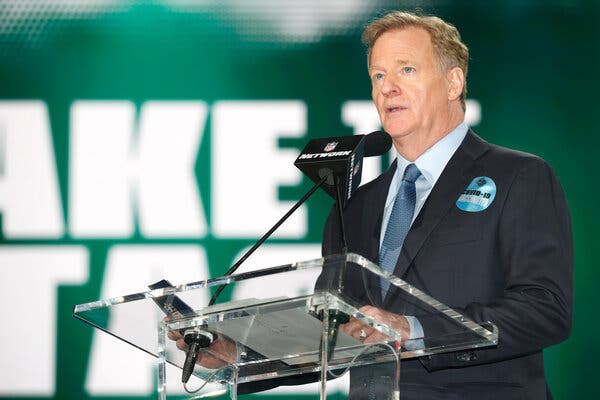
Throughout the off-season, the N.F.L. had stopped short of requiring that its players and other team personnel receive a Covid-19 vaccination, instead strongly encouraging inoculation.
But with training camps starting in earnest next week and the regular season less than two months away, that approach has shifted.
Commissioner Roger Goodell on Thursday sent a memo to all 32 teams outlining Covid-19 guidelines for the 2021 season that detail drastic penalties for teams with unvaccinated personnel, including the forfeiture of games. Any forfeits could result in players’ not being paid — if their infections are known to have caused an outbreak.
While the memo does not mandate vaccination, it represents the N.F.L.’s strongest stance yet amid the coronavirus pandemic, showing how seriously it wishes to avoid the hurdles of 2020. The new directives highlight the ongoing question of whether employers should require workers to be vaccinated and cast a hard line between vaccinated team personnel and their peers who are hesitant or loath to be inoculated.
Rick Dennison, an assistant coach for the Minnesota Vikings, on Friday was dismissed after refusing to be vaccinated, ESPN reported. Cole Popovich, an assistant coach for the New England Patriots, also departed his team because of virus guidelines, according to ESPN.
In a conference call with reporters, Allen Sills, the N.F.L.’s chief medical officer, said 80 percent of all players had received at least one dose of the vaccine as of Friday. Other sports leagues have reported a high number of vaccinations. The W.N.B.A said in June that 99 percent of its players were vaccinated, while the N.B.A. reported 90 percent. More than two-thirds of Major League Baseball’s teams have reported an 85 percent vaccination rate.
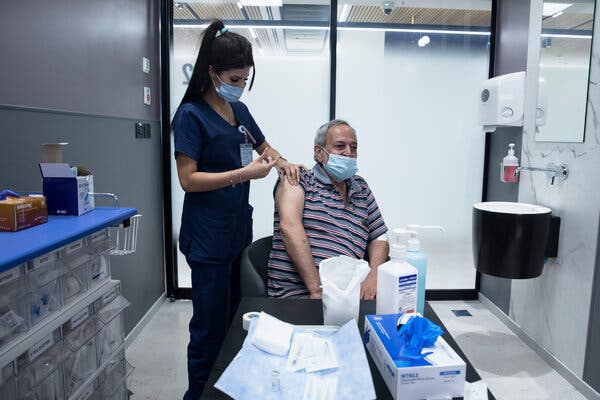
As Israel struggles with a new surge of coronavirus cases, its health ministry reported Thursday that although effectiveness of the Pfizer-BioNTech vaccine remains high against severe illness, its protection against infection by the coronavirus has diminished significantly compared with this winter and early spring.
Analyzing the government’s national health statistics, researchers concluded that Pfizer’s shots, while offering vaccinated people 90 percent less risk of severe disease, gave them only 39 percent less risk against infection in late June and early July, compared with 95 percent from January to early April.
Israeli scientists cautioned that the new study is much smaller than the one in May and measured cases in a narrower window of time. As a result, a much larger range of uncertainties flanks their estimates, which could also be skewed by a variety of other factors.
Nevertheless, the new estimates are raising concern in Israel and elsewhere, including the United States. Possible reasons for the apparent loss of effectiveness against infection include the rise of the highly contagious Delta variant or a waning of protection from the shots over time.
Dr. Ran Balicer, the chairman of Israel’s Covid-19 National Expert Advisory Panel, said that the challenges of making accurate estimates of vaccine effectiveness are “immense.” He said that more careful analysis of the raw data was needed to understand what is going on.
Israel launched an aggressive campaign with the Pfizer vaccine on Dec. 20, and 58 percent of the population is now fully vaccinated, one of the highest rates in the world. Cases have increased 165 percent over the last two weeks, but hospitalizations, a measure of severe disease, continue to trend downward, according to Our World in Data, a project at the University of Oxford.
The vaccinations, paired with tight restrictions that the government imposed on travel and meetings, helped bring the country’s daily caseload down from a peak of over 8,600 cases a day in January to just a few dozen.
Israel began relaxing its restrictions in the spring. In late June, with the Delta variant spreading, cases surged again. Now, over 1,000 people are testing positive each day, including among fully vaccinated people. Epidemiologists had expected such breakthrough infections, as they do with all vaccines.
Adding to the uncertainty of the new findings is that the surge has not spread evenly across the country. Some travelers infected with the highly contagious Delta variant have brought it back to neighborhoods where vaccination rates are relatively high, while new outbreaks have yet to swamp Orthodox Jewish and Arab Israeli communities, where vaccination rates are lower. That imbalance could appear to make the vaccine seem less effective.
Also, the people who got vaccinated at the start of the campaign were over 60; those who got them later were younger. Infections among those who got vaccinated early may have more to do with their age, or some other factor that researchers have yet to take into consideration.
However, if the vaccine’s protection against infection is indeed waning after six months, the implications could be enormous, including on deliberations about whether to give people a third shot.
Dr. Balicer said that he and colleagues at Clalit Health Services, where he is the chief innovation officer, were working on their own study on the effectiveness of the vaccine, using Clalit’s health care records to take into account such confounding factors.
“I think there is definitely some waning, but not as much as hypothesized based on the crude data,” said Dr. Balicer, noting that other factors may be in play. “We are now trying to figure it out in a clean way.”

When companies began announcing tentative return-to-office plans this spring, there was a sense of optimism behind the messages.
In recent days, that tone has suddenly shifted. The Delta variant, a more contagious version of the coronavirus, is sweeping through the country. Less than half of Americans are fully vaccinated, exacerbating the situation.
It all adds up to a difficult calculation for America’s business leaders, who hoped the country would already be fully on a path to normalcy, with employees getting back to offices. Instead, individual companies are now being forced to make tough decisions that they had hoped could be avoided, such as whether to reverse reopening plans or institute vaccine mandates for employees. All the while, they continue to grapple with the unpredictable nature of the pandemic.
“It’s emotionally draining on all of us, and it drives the top management teams crazy,” said Bob Sutton, a psychology professor at Stanford University who studies leadership and organizations. He said some executives he had advised were “pulling their hair out” over what to do.
Several hospital systems that previously held off making vaccines mandatory for health care workers are now willing to do so. Google employees in California who have returned to the office on a voluntary basis are again wearing masks indoors.
Goldman Sachs is considering whether to reinstitute testing for fully vaccinated employees in the company’s New York City offices, according to a person familiar with the situation who spoke on condition of anonymity because nothing had been decided. And on Monday, Apple told its work force that it would push back its return-to-office date from September to October.
For employers wary of the legal ramifications and political backlash of mandating a vaccine, the tide has begun to turn, if ever so sightly.
“At the beginning, there were a lot of employers that were concerned about jumping in too soon and being the one out front — it is a divisive issue,” said David Barron, a labor and employment lawyer at the law firm Cozen O’Connor. “The calculus starts to shift a little bit when you see another spike.”
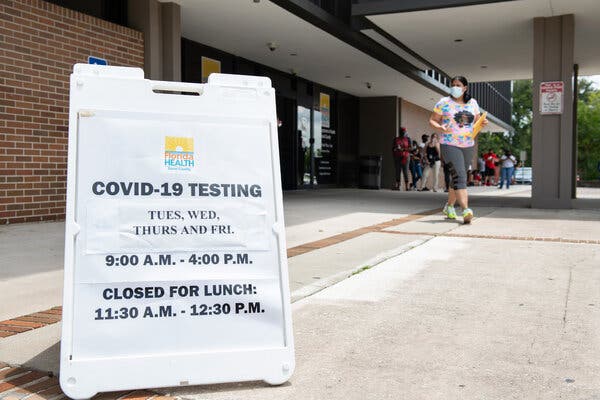
MIAMI — A month ago, the number of Covid-19 patients admitted at two University of Florida hospitals in Jacksonville was down to 14. Now more than 140 people are hospitalized with the virus, a tenfold increase over five weeks — and the highest number of Covid patients this system has seen since the start of the pandemic.
Higher than last summer, when the coronavirus slammed Florida. Higher than over the winter, when the virus surged to devastating levels across the nation.
A national uptick in coronavirus cases has led, in sudden and concerning fashion, to a steep rise in hospitalizations in some spots around the country where people have been slower to get vaccinated, a predicament experts hoped might be avoided because the people contracting the infection tend to be younger and healthier.
Nationally, hospitalizations remain relatively low, nowhere near earlier peaks of the pandemic. But in some regions with lagging vaccination rates and rising virus cases — such as Northeast Florida, Southwest Missouri, Southern Nevada — the highly contagious Delta variant has flooded intensive care units and Covid wards that, not long ago, had seen their patient counts shrink.
“It’s very frustrating,” said Dr. Leon L. Haley Jr., the chief executive of UF Health Jacksonville. “Each day we continue to go up. There’s no sense of when things are going to curtail themselves. People are stretched thin.”
The situation is worrying across Northeast Florida. The Mayo Clinic in Jacksonville is on track to match or exceed its earlier record. Wolfson Children’s Hospital has its second-highest number of admissions, 45, after reaching 57 in January. About 90 miles south, in Daytona Beach, an AdventHealth hospital has more Covid patients than ever before.
About a fifth of all national cases over the past two weeks have originated in Florida, which has emerged as a microcosm of the nation’s mounting Covid worries. The state has the fourth-highest hospitalization rate, behind Nevada, Missouri and Arkansas.
Congressional Memo
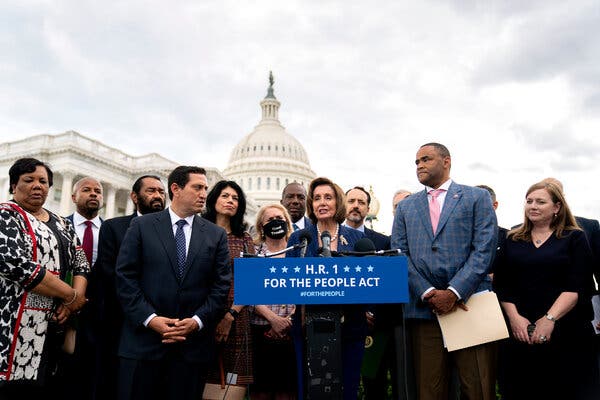
Breakthrough coronavirus cases have emerged in multiple offices in Congress, including the speaker’s. The line for in-house testing snakes through a long corridor and into a visitors’ center atrium. The Capitol’s doctor has warned of the possible return of a mask mandate.
The Delta variant has reached Capitol Hill, but a common enemy has only made recriminations and anger worse between the two political parties.
Republicans, caught between a political base that is often resistant to vaccination and an imperative to save the lives of their voters, point their fingers at Democrats and blame them, without evidence, for covering up the virus’s origins.
Democrats fault Republicans who have done little to push back against vaccine skeptics in their ranks, and even now are soft-pedaling their calls for people to take the shot.
For much of the vaccinated nation, the coronavirus resurgence is somewhere else. In states like Vermont, Hawaii and Massachusetts, where at least 84 percent of the adults have at one shot or two, surges in Alabama, Florida, Missouri and Arkansas are far, far away.
But the Capitol is one of the few places in America where red and blue mingle almost daily — and resentment is high.
“Congress is like a nationwide convention every single day,” said Representative Jamie Raskin, a Democrat who has begun wearing a mask again, though he is fully vaccinated and 76.5 percent of adults in his state of Maryland have received at least one shot. “There are people who have come from every corner, hamlet and precinct of the country. It’s a petri dish for the development of political ideas, but also plagues.”
Republicans point out that the most recent high-profile carriers of the current plague were Democrats, Texas legislators who fled Austin to stop passage of a measure restricting voting. Six of them — all of whom said they were vaccinated — then tested positive, and are suspected of infecting a senior aide to Speaker Nancy Pelosi. The aide, who was also vaccinated, is mildly symptomatic.
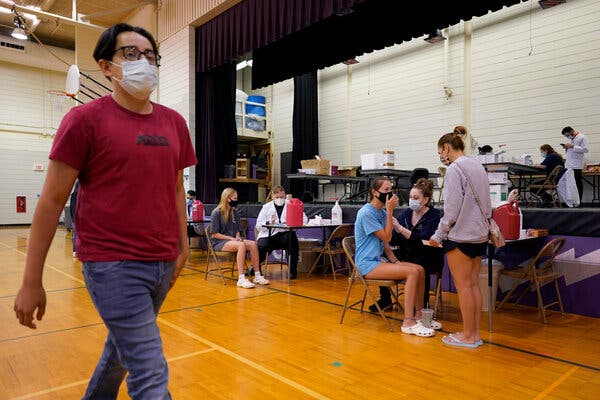
Chicago Public Schools will require everyone to wear masks in school buildings when the new academic year starts, regardless of their vaccination status, according to guidelines the school system released on Thursday.
With the decision, Chicago joins New York City and several other large jurisdictions, including the state of California, in imposing stricter health guidelines for students and teachers than the federal government has recommended.
In a letter to public school parents and children, Jose Torres, the interim chief executive of Chicago Public Schools, wrote that the rule on face covering would apply to students, staff members and visitors.
“Continuing to require masks will help make sure those in our school communities who are not yet eligible for the Covid-19 vaccine, which encompasses the majority of our students, remain as safe as possible,” Mr. Torres wrote.
The Centers for Disease Control and Prevention issued new guidance earlier this month that called for a full return to classrooms in the fall and recommended that masks be optional for fully vaccinated students and staff.
But the guidance left a lot of details up to state and local governments, advising districts to use local coronavirus data to guide decisions about when to tighten or relax prevention measures like masking and physical distancing. It also recommended that unvaccinated students and staff members keep wearing masks.
Chicago’s announcement came a day after the Virginia Department of Health and Department of Education said that masks should be worn indoors in public elementary schools, regardless of vaccination status. The state’s return-to-school guidelines also encourage mask-wearing indoors in middle and high schools for those who are unvaccinated. But Virginia stopped short of issuing a universal mask mandate, leaving that decision up to schools.
Chicago’s decision on masks was based in part on recommendations from the American Academy of Pediatrics, which took a more conservative approach than the C.D.C. by recommending that everyone over age 2 wear masks this fall, even if they have been vaccinated. But both the A.A.P. and the C.D.C. support a return to in-person learning.
With the new academic year just weeks away, mask rules are being closely watched — sometimes provoking controversy. On Thursday, two advocacy groups for parents in California filed a lawsuit against the state’s governor and top health officials over the state’s requirement that children must wear masks at school even if they are vaccinated.
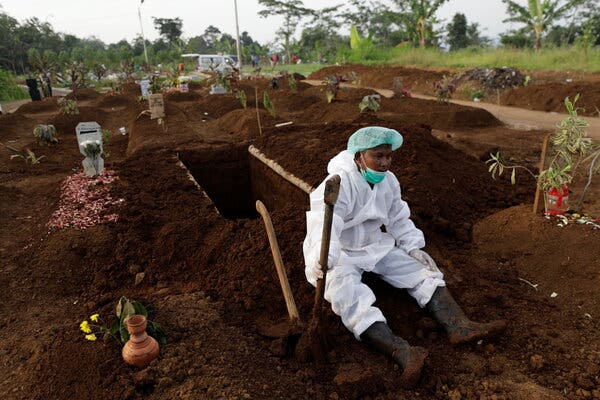
The spread of the super-contagious Delta variant has prompted new restrictions around the world and spurred stark new warnings from public health officials.
Here are some of the questions people have raised about the variant.
Why are people worried about the Delta variant?
Delta, formerly known as B.1.617.2, is believed to be the most transmissible variant yet, roughly twice as contagious as the original virus. Other evidence suggests that the variant may be able to partially evade the antibodies made by the body after a coronavirus infection or vaccination.
But much is still unknown or unproven, including whether this variant may cause more severe illness.
Where is it spreading?
Delta has been reported in 124 countries, and is now the most common variant in many of them.
It first appeared in the United States in March and spread quickly. In early April, Delta represented just 0.1 percent of cases in the United States, according to the Centers for Disease Control and Prevention. The agency now estimates that the number has hit 83.2 percent.
Does the Delta variant cause different symptoms?
It’s not clear yet. “We’re hurting for good data,” said Dr. Michael Osterholm, director of the Center for Infectious Disease Research and Policy at the University of Minnesota. In Britain, where the variant is widespread, reports have emerged that Delta may cause different symptoms than other variants do.
If I’m vaccinated, do I need to worry?
Although there is not yet good data on how all of the vaccines hold up against Delta, two doses of several widely used shots, including those made by Pfizer and BioNTech, Moderna and AstraZeneca, appear to retain most of their effectiveness against the Delta variant, research suggests.
Even with Delta, breakthrough infections, or infections in people who have been fully vaccinated, remain relatively rare, scientists believe, and tend to be mild or asymptomatic.
Will Delta return us to last year’s pandemic peak?
After a long and steady decline, cases are on the rise again in the United States, likely fueled by Delta.
But the numbers remain far below last winter’s peak, and experts do not expect them to rise that high again. “I think we are not going to see another big, national surge in the United States because we have enough vaccination to prevent that,” Dr. Michael Osterholm said last month.
What can I do?
Get vaccinated. If you’re already vaccinated, encourage your family, friends and neighbors to get vaccinated.
Face masks, which remain a particularly important tool for those who are ineligible for or do not have access to vaccines, can provide additional protection.